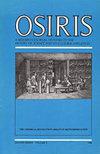介绍
IF 1
3区 哲学
Q2 HISTORY & PHILOSOPHY OF SCIENCE
引用次数: 0
摘要
本导言概述了本卷的主题、目的和目标。其论点是,现代社会讨论算法文化的性质和影响的主流模式是从劳动史和科学史的现有趋势演变而来的,其中一个独特的元素是“工艺”(软的人类判断)和“代码”(硬的机械逻辑)之间的尖锐的二元解释。体积表明这个二进制已经不够了。它建议在代码工艺领域打造一个关于算法和人类多样性的新词汇——一个更好地指导历史调查的词汇,让我们能够应对算法治理,甚至提高我们对算法进步背后力量的理解。本文章由计算机程序翻译,如有差异,请以英文原文为准。
Introduction
This introduction summarizes the themes, purposes, and objectives of the volume. Its thesis is that the prevailing mode of discussing the nature and impact of algorithmic culture in modern society evolved from existing trends in labor history and the history of science, one distinctive element of which is a sharp interpretative binary between “craft” (soft, human judgment) and “code” (hard, mechanistic logic). The volume suggests that this binary is no longer adequate. It suggests forging a new vocabulary of algorithmic and human diversity in the code-craft space—one better equipped to guide historical investigation, allow us to grapple with algorithmic governance, and even improve our understanding of forces underlying algorithmic advancement.
求助全文
通过发布文献求助,成功后即可免费获取论文全文。
去求助
来源期刊

Osiris
管理科学-科学史与科学哲学
CiteScore
1.10
自引率
0.00%
发文量
18
审稿时长
>12 weeks
期刊介绍:
Founded in 1936 by George Sarton, and relaunched by the History of Science Society in 1985, Osiris is an annual thematic journal that highlights research on significant themes in the history of science. Recent volumes have included Scientific Masculinities, History of Science and the Emotions, and Data Histories.
 求助内容:
求助内容: 应助结果提醒方式:
应助结果提醒方式:


